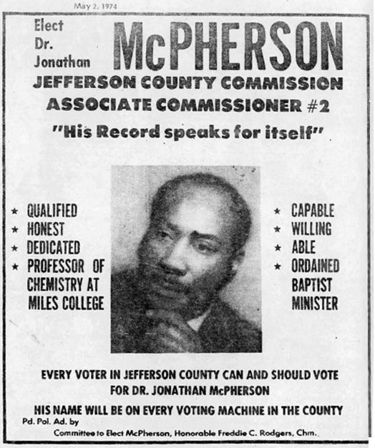Jonathan McPherson
Jonathan McPherson is pastor of St John Baptist Church in Edgewater, operator of the Scott-McPherson Funeral Home in Fairfield, and a former Miles College chemistry professor and Civil Rights activist.
McPherson and student Frank Dukes worked together to plan the 1962 Selective Buying Campaign and guarded homes in Dynamite Hill used as meeting places for leaders of the 1963 Birmingham Campaign. He, along with Dukes, U. W. Clemon and Shelley Millender delivered a petition in favor of desegregation to the Birmingham City Commission during a public meeting. He was jailed along with Martin Luther King Jr and other protesters in April 1963.
Later that year, McPherson became the first African American to pass the patrolman examination given by the Birmingham Police Department. He also passed civil service examinations for firefighter, clerk, and deputy sheriff. His application to become a police officer was initially rejected because it was claimed he failed to appear for an interview (of which he claims never to have been notified). In October, Birmingham personnel director Ray Mullins told the Birmingham News that McPherson had failed a credit check (which he also denies). His application was ultimately rejected because he had moved to Hueytown. The department hired its first black officer, Leroy Stover, in 1966.
A PhD recipient, McPherson taught chemistry at Miles for 28 years and assumed operations of the Scott-McPherson Funeral Home in 1978.
McPherson ran for Jefferson County Commission in 1974, for the 7th Congressional District of Alabama in 1992, and to represent District 57 in the Alabama State House of Representatives in 2006. In 1992 McPherson ran on the Republican ticket, but supported Barack Obama in the 2008 election.
References
- Gray, Jeremy (February 28, 2011) "Martin Luther King guard, Birmingham's Rev. Jonathan McPherson, working on memoir." The Birmingham News
- Gray, Jeremy (October 31, 2013) "How a chemistry professor nearly became Birmingham's first black police officer in 1963." The Birmingham News
